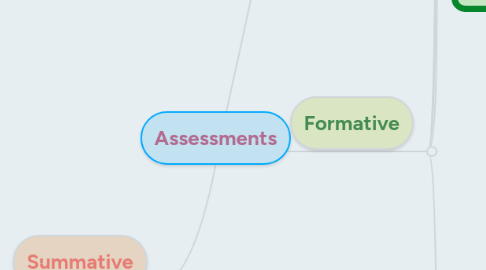
1. Summative
1.1. The Definition
1.1.1. used to evaluate student learning, skill acquisition, and academic achievement
1.2. The Reason
1.2.1. format
1.2.2. teaches assessment taking skills
1.2.3. to prepare students
1.2.4. test length
1.2.5. types of question
1.2.6. review
1.3. Planning
1.3.1. end of a large chunk of learning
1.3.2. review what you want to do
1.3.3. criteria for ensuring a high-quality assessment
1.3.4. representative sampling
1.3.5. Examples: standardized testing, final exams, major cumulative projects, research projects
1.4. Conducting Summative Assessments
1.4.1. Scheduled
1.4.1.1. after a large chunk of learning
1.4.1.2. end of six week
1.4.1.3. end of the semester
1.4.2. Created
1.4.2.1. directions
1.4.2.2. items
1.4.2.3. layout
1.5. Delivery Types
1.5.1. paper and pencil
1.5.2. online
1.6. Question Types
1.6.1. multiple choice
1.6.2. matching
1.6.3. sequencing
1.6.4. true or false
1.6.5. fill-in the blanks
1.6.6. short answer
1.6.7. essay
1.7. Scoring Types
1.7.1. human
1.7.2. distributed
1.7.3. automated
1.7.4. rubric
1.7.5. checklists
2. Jennifer Richardson
2.1. EDIT 3318 - D81
2.2. Mrs. Tickle
2.3. Texas Tech University
2.4. Summer 2016
3. Formative
3.1. Definition -
3.1.1. a wide variety of methods that teachers use to conduct in-process evaluations of student comprehension, learning needs, and academic progress during a lesson, unit, or course.
3.2. The Reasons -
3.2.1. to provide feedback
3.2.2. to adjust instruction strategies to enhance achievement
3.3. The Cycle -
3.3.1. gather evidence of learning
3.3.2. evaluate evidence
3.3.3. adjust instruction
3.3.4. feedback
3.4. Characteristics
3.4.1. Evidence of student learning
3.4.2. structure
3.4.3. participants involved feedback
3.4.4. instruction adjustments
3.4.5. teacher-student interaction
3.5. Types of Formative Assessment
3.5.1. Six Types of Formal Formative Assessment
3.5.1.1. pretests
3.5.1.2. Structured exercises
3.5.1.3. homework
3.5.1.4. classwork
3.5.1.5. quizzes and test
3.5.1.6. classroom response systems
3.5.2. Formal
3.5.2.1. sequenced activites
3.5.2.2. planned activity
3.5.2.3. pre-assessments
3.5.3. Infromal
3.5.3.1. questioning
3.5.3.2. observation
3.5.3.3. spontaneous
3.5.3.4. immediate feedback
3.5.3.5. immediate instructional adjustments
